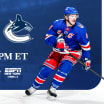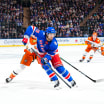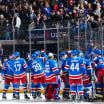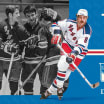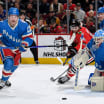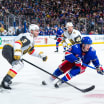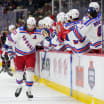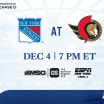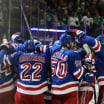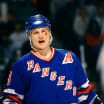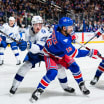Over 1,000 players have had the opportunity to play for the New York Rangers throughout the franchise's history. In that time, only 28 players have had the honor of being the Rangers' captain, with Jacob Trouba becoming the newest member of that exclusive group.
Each captain has led in his own way, and together, they helped shape the story of the Rangers franchise through their play and leadership on and off the ice.
Journey at 'C'
Trouba Carries on the Legacy of the Rangers' Captaincy
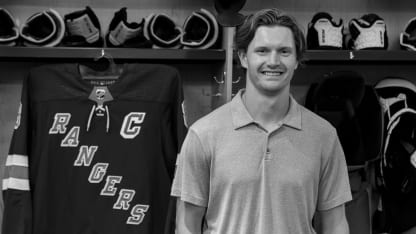
By
Michael Rappaport
Bill Cook was the Rangers' first captain, receiving the honor during the team's first-ever Training Camp prior to the 1926-27 season. It was one of many Rangers "firsts" that Cook would accomplish throughout his Rangers career, as he scored the first goal in Rangers history in the franchise's first game on November 16, 1926, was the first Ranger to lead the NHL in goals and points in a season (which both happened in the team's inaugural 1926-27 season), was the first Ranger captain of a Stanley Cup Championship team (1927-28 and 1932-33), and was the first player who spent the majority of his career with the Rangers to be inducted into the Hockey Hall of Fame (1952). Cook served as the Rangers' captain for 11 seasons, which is the longest tenure any captain has had for the Blueshirts in franchise history. … Art Coulter succeeded Cook as captain at the start of the 1937-38 season. A punishing hitter and stalwart defenseman, Coulter was named to the NHL's Second All-Star Team in each of his first three seasons as the team's captain. Coulter was also the Rangers captain for the third Stanley Cup in franchise history in 1939-40. Coulter's playing career and tenure as captain didn't end as a result of a trade or signing with another team as a free agent, but rather as a result of him joining the United States Coast Guard during World War II. … Ott Heller was in his 12th season with the Rangers when he became the team's captain for the 1942-43 season. Heller had the unenviable task of trying to lead a Rangers roster that was ravaged as numerous players, like his predecessor Coulter, joined the War effort. … Heller served as Rangers captain for three seasons before turning over the reins to Neil Colville. Colville missed the majority of three seasons while serving in the Canadian Armed Forces, and he was named captain before the start of the 1945-46 season. A star player as a center on the Rangers' "Bread Line" throughout the late-1930s and early-1940s, Colville switched positions upon his return to the Rangers and became a defenseman. Colville made the adjustment and was named to the NHL's Second All-Star Team in 1947-48, as he also helped the Rangers reach the playoffs for the first time since 1941-42. Colville's tenure as captain ended on December 21, 1948 as part of an organizational shift in which he went to coach the Rangers' American Hockey League team in New Haven. … Buddy O'Connor served as the Rangers' captain for the 1949-50 season. In his first season with the Rangers in 1947-48, O'Connor won the Hart Trophy and Lady Byng Trophy, becoming the first player in NHL history to win both awards in the same season. In his one season as captain, O'Connor helped the Rangers advance to the Stanley Cup Final. …Frank Eddolls replaced O'Connor as the Rangers' captain at the start of the 1950-51 season. Eddolls was a prolific all-around defenseman who specialized in breaking up the opposing team's offensive attack at his own blue line. He served as captain for parts of two seasons before he went to coach the Rangers' minor league team in Saskatoon on December 6, 1951. In a connection of Rangers captains, Eddolls replaced Bill Cook in Saskatoon, because Cook was replacing Neil Colville as Rangers head coach … Allan Stanley was named Rangers captain on December 19, 1951, and he scored a goal in that night's game to help the Rangers defeat the Canadiens. Stanley joined the Rangers with great fanfare, finishing as the runner-up for the Calder Trophy to teammate Pentti Lund in 1948-49, and was on his way to a Hall of Fame career. However, shortly after being named captain, Stanley missed nearly two months as a result of separating his shoulder. The injury affected Stanley even after he returned later in the 1951-52 season. Stanley served as captain through the 1952-53 season and early into the 1953-54 season. …Don Raleigh was named Rangers captain on November 4, 1953, shortly into his eighth season with the Rangers. Raleigh was only 27 years old at the time, but had played in the NHL with the Rangers as a 17-year-old during the 1943-44 season. Small in stature, Raleigh was nicknamed "Bones" because of how skinny he was. However, his creativity made him one of the Rangers' most dangerous offensive players in the late-1940s and early-1950s. Raleigh finished in the top-five in voting for the Lady Byng Trophy in each of his two seasons as the Rangers captain. … Prior to the 1955-56 season, new Rangers head coach Phil Watson named Harry Howellas the team's captain. At just 22 years old, Howell was the youngest captain in franchise history at the time. Howell was on his way to a Hall of Fame career and ultimately becoming the franchise's all-time leader in games played. But after Howell's second season as captain in 1956-57, Howell and the Rangers agreed that it would be better for him in the long run to remove the weight of the 'C' at that point in his career … George "Red" Sullivan was named Rangers captain on September 12, 1957, and served as the team's captain for four seasons. In that time, he was a fan favorite for his combination of hustle, determination, and skill. Sullivan didn't miss a regular season game during his four seasons as Rangers captain, and he played in three consecutive NHL All-Star Games. Like several of his predecessors, Sullivan's on-ice career with the Rangers, as well as his tenure as captain of the team, ended when he was named player/coach of the Rangers' minor league team in Kitchener-Waterloo before the 1961-62 season. … Andy Bathgate had played parts of nine seasons with the Rangers before he was named captain, but he had already established himself as the face of the franchise by that time. Bathgate won the Hart Trophy in 1958-59 and had been featured on the cover of Sports Illustrated. Bathgate scored a hat trick in his first home game as captain and went on to make the NHL's First All-Star Team in 1961-62, as he led the NHL in assists and tied for the league lead in points. Bathgate was the most prolific Ranger of his era and one of the greatest players in franchise history. At the time he was traded by the Rangers to the Toronto Maple Leafs on February 22, 1964, Bathgate held franchise records in several categories, including career goals, assists, and points. … Camille Henry replaced Bathgate as Rangers captain after Bathgate was traded. Henry was in his 10th season with the Rangers at the time he was named captain and was a dynamic goal scorer throughout his tenure. Although he was one of the smallest players in the NHL during his career, Henry, who was nicknamed "The Eel", proved to be a dynamic and crafty player. Henry won the Calder Trophy in 1953-54 and the Lady Byng Trophy in 1957-58, and he remains the Rangers' all-time leader in power play goals. Nearly a year after he was named captain, Henry's tenure as captain ended, as he was traded to the Chicago Black Hawks on February 4, 1965. …Bob Nevin was one of five players the Rangers acquired from the Maple Leafs as part of the Bathgate trade in 1964, and a day after the Rangers traded Henry, he was named captain. Nevin emerged into a reliable two-way player for the Rangers as the team improved throughout the 1960s. In his final season with the Rangers in 1970-71, Nevin scored the game-winning goal in overtime of Game 6 of the Quarterfinals against the Maple Leafs, helping the Rangers eliminate Toronto and advance to the Semifinals. Nevin served as captain for parts of seven seasons and for 449 games, which are both the third-most in franchise history. Nevin was traded to the Minnesota North Stars following the 1970-71 season. … Vic Hadfield replaced Nevin as Rangers captain and instantly had one of the best seasons that any captain has had in franchise history. As part of the famed 'G-A-G Line' with Jean Ratelle and Rod Gilbert, Hadfield scored 50 goals in 1971-72, becoming the first Rangers player to accomplish the feat. In addition, Hadfield helped the Rangers advance to the Stanley Cup Final. A heart-and-soul player, Hadfield was a premier power forward in his era and led by example, standing up for his teammates whenever necessary. Hadfield's tenure as captain lasted three seasons, as he was traded to the Penguins following the 1973-74 season. … Brad Park was named Rangers captain in the summer of 1974. At 26 years old, Park had already established himself as a superstar, as he was named to either the NHL's First All-Star Team or Second All-Star Team in five consecutive seasons from 1969-70 - 1973-74, and he was the runner-up for the Norris Trophy in four of those seasons. Early into his second season as Rangers captain, Park was involved in one of the biggest trades in franchise history, as he and Ratelle were traded to the Boston Bruins. … One of the players the Rangers received in exchange for Park, Phil Esposito, was named captain upon his arrival to the Rangers. Although it took time for Esposito to get used to New York and the Rangers - and for Rangers fans to accept Esposito as one of their own - he became the leader for a core group of young Rangers who were developing in the mid-1970s. However, just before the start of the 1978-79 season, Esposito decided to relinquish the captaincy. … When Dave Maloney succeeded Esposito as Rangers captain, he became the youngest captain in franchise history, which is a distinction he still holds. Maloney's first season as captain was magical for the Rangers, as the underdog Blueshirts upset the rival Islanders in the Semifinals to advance to the Stanley Cup Final. During the 1980-81 season, Maloney spoke with new Rangers head coach and general manger Craig Patrick about splitting the captaincy with some of his teammates, and he ultimately relinquished the captaincy one-third of the way through the season. … Walt Tkaczuk took over as Rangers captain on December 7, 1980, and he tallied three points in each of his first two games as captain. A career Ranger, Tkaczuk was the only player who was on both Rangers teams that went to the Stanley Cup Final in the 1970s (1971-72 and 1978-79). On February 2, 1981, Tkaczuk was hit with a puck above his right eye, and the injury ended his playing career. … Barry Beck was 23 years old when he played his first game as Rangers captain on February 4, 1981. The Rangers acquired Beck early in the 1979-80 season and hoped he would be the backbone of a team that could win the Stanley Cup. Beck was an all-around defenseman who could impact the game with offense as much as he could with a big hit. Unfortunately for Beck, he dealt with several injuries that hindered his performance throughout his Rangers tenure. Beck played 307 games as Rangers captain over parts of six seasons; the 307 games and six seasons as captain are each the fourth-most in franchise history. … Ron Greschner was named Rangers captain at the start of the 1986-87 season. Greschner was a career Ranger and the longest-serving member of the team at the time he was named captain. Greschner's tenure as captain lasted parts of two seasons, as he relinquished the captaincy in December of 1987 because he felt that one of the younger players on the team deserved it more than he did. … Kelly Kisio was named captain on December 24, 1987, midway through his second season with the Rangers. Kisio, who was acquired from the Red Wings before the 1986-87 season, was a tenacious player who gave everything he had every game. Kisio averaged nearly a point per game during his first four seasons as a Ranger, but injuries hampered his 1990-91 season. Kisio's tenure with the Rangers ended when he was claimed in the NHL Expansion Draft following the 1990-91 season. … The Rangers began the 1991-92 season without a captain, but when Mark Messier was acquired by the Rangers from the Edmonton Oilers the day after the season opener, there was little doubt that he would become the next captain of the Blueshirts. Messier was officially named captain prior to the Rangers' home opener on October 7, 1991, and his unique leadership was on display immediately. Messier's tangible impact on the ice was equaled, if not surpassed, by the intangibles he brought off the ice, and in his first season as a Ranger in 1991-92, he won the Hart Trophy. Messier's crowning moment with the Rangers came in 1993-94, when he led the Rangers to a Stanley Cup Championship and became the first player in NHL history to be the captain of a Stanley Cup winner for two different franchises. … Following Messier's departure, Brian Leetch was named Rangers captain and became the first American-born captain in franchise history. One of the greatest players in Rangers history, as well as one of the greatest American-born players in NHL history, Leetch handled the captaincy the way he handled everything throughout his career - with class, honor, and dignity. Leetch served as Rangers captain for three seasons, and when Messier returned to the Rangers before the start of the 2000-01 season, Leetch gave the captaincy back to him. … Messier served as Rangers captain for four more seasons after returning to the Rangers. In that time, he passed Gordie Howe to become the second-leading point scorer in NHL history, and he scored a goal in his final NHL game on March 31, 2004 at MSG. Messier played 697 regular season games and 70 playoff games as Rangers captain, which are each the most in franchise history. … The Rangers did not have a captain for the 2005-06 season, but one player emerged throughout that season as the team's leader. Jaromir Jagr established single-season franchise records for goals and points in that 2005-06 season, and he was named captain prior to the Rangers' 2006-07 season opener. One of the greatest players in NHL history, Jagr began his tenure as Rangers captain by scoring a goal on his first shift of the 2006-07 season. Jagr helped the Rangers advance to the playoffs in each of his two seasons as captain, and he led the team in scoring in each season. … Chris Drury was named Rangers captain at the start of the 2008-09 season. In his three seasons as Rangers captain, Drury was a terrific all-around player who led by example. Throughout his tenure, Drury was just as likely to score a late goal to tie a game or win a game as he was to sacrifice his body in order to block a shot. Drury won the Players' Player Award in two of his three seasons as captain. … Ryan Callahan was the embodiment of the John Tortorella-coached Rangers teams in the early-2010s, so it came as no surprise when Callahan was named captain prior to the start of the 2011-12 season. Callahan was a heart-and-soul player who laid his body on the line every night. He won the Players' Player Award three consecutive seasons and the Steven McDonald Extra Effort Award four times during his Rangers tenure, and he won both awards in each of his two full seasons as captain in 2011-12 and 2012-13. … Ryan McDonagh was instrumental in the Rangers' run to the Stanley Cup Final in 2014 and was an ideal choice to replace Callahan as Rangers captain at the start of the 2014-15 season. An all-around defenseman who made his presence felt at both ends of the ice, McDonagh led by example and battled through numerous injuries in the Rangers' playoff runs during his tenure as captain. … After McDonagh was traded in February of 2018, the Rangers decided to not name a captain. As the roster went through several changes, the organization was patient in finding the right player to lead the team for the foreseeable future. … Jacob Trouba is entering his fourth season with the Rangers, and his first as the team's captain in 2022-23. An all-around defenseman who has emerged as a leader by his play on the ice and actions off the ice, he will lead the Rangers and carry on the proud tradition of wearing the 'C' for this franchise.


